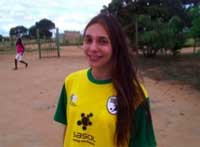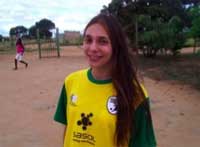 KINGSTON, RI – November 3, 2010 – Once upon a time…
KINGSTON, RI – November 3, 2010 – Once upon a time……when University of Rhode Island graduate student Angelina Carnevale was in first grade, she came home crying because the school library wouldn’t allow her to check out a book they thought was beyond her level.
“The book had no pictures,” the 24-year-old Warwick resident explained. “It was Madelaine L’Engle’s A Wrinkle in Time – and I’d been reading chapter books since before I started school. So my mom walked me down the block to the local library, got me a library card and said, ‘You can take out any book you want.’ I was in heaven.”
Carnevale’s lifelong love affair with the written word is translating into a career that brought her to South Africa this year, where she introduced books to children and adults who had never seen a computer, let alone imagine Kindle book downloads.
She is in the three-year program leading to a Master’s in Library Science at URI, and will graduate next spring. Among the requirements is credit in Professional Field Experience – which in January 2010 took her to the Southern African Wildlife College, located on a game reserve in Limpopo Province, South Africa. “I did it all on my own,” she noted, “paid to get the entry visa, and for the plane ticket and the college fees.”
About a hundred students are enrolled and live in cottages on the Wildlife College campus, Carnevale said. “Another hundred or so students bring tents and pitch them in the fields on campus – it’s surrounded by an electrified fence, so we didn’t have to worry about wild animals.”
Except for the baboons, that is. Occasionally one would leap the fence to raid the trees of marula fruit. There were squirrels in the thatched roof of the cottage Carnevale shared with other staff. Snakes slithered, and a scorpion hid in her bed. “It wasn’t all cheetahs and rainbows,” she joked.
In the small college library on campus, with local librarian Sunel Lindeque, Carnevale spent her days chronicling materials relating to wildlife, creating displays, cataloging, and assisting students. She was first surprised, then appalled, by the lack of resources available to children and adults in nearby villages, where “poverty was just business as usual,” with an unemployment rate that was “staggering,” and education beyond primary school not guaranteed.
“What struck me was the complete and utter lack of books,” Carnevale said. Other than at the college, which did not offer public access, “there wasn’t a library around for miles. In the schools, students had blank notebooks, and copied all their lessons from the teachers’ notes on the chalkboards and their lectures. It was something I knew I had to change.”
The idea of a bookmobile “came a lot sooner than it panned out,” she said. “I did a lot of work early on into where I might get books. And money to pay for them.”
Initial appeals to government and non-profit agencies were to no avail, but there was one person who took an immediate interest. Gale Eaton, professor and Carnevale’s supervisor in URI’s Graduate School of Library and Information Services, had been following activities on a personal blog Carnevale was writing to keep family and friends updated.
Eaton was intrigued, as was Janice Hromi, GSLIS student affairs officer. Their donations allowed the purchase of 100 books in the local languages of Shangaan and Sotho. (South Africa has 13 official languages and many more tribal languages and dialects. English is the common language; Afrikaans, a mixture of Dutch and Zulu, was the language of the original white settlers.)
“I was just so charmed by what Angelina was doing,” Eaton said. “The central purpose of librarianship is to support people in their quest for information and knowledge – not just as a means to an end, but for what enriches you, what makes you whole.”
Carnevale was able to find “a select few publishers” specializing in native language books, ordered them, and they began arriving just as her time in South Africa was up. Reaction among villagers of all ages was immediate, translating into tears of joy.
“They have so little – the bare necessities – and they are so incredibly grateful for everything they get,” Carnevale said.
Even after her departure at the end of term, the project continued to grow. A grant proposal Carnevale had written was accepted, and 300 more native-language books were purchased and donated to the mobile library, which continues to make its rounds of the schools under the guidance of Lindeque and a volunteer.
In a recent e-mail to Carnevale, Lindeque envisioned the college library as developing into “an education center where students can come and study after school. We will have a reading area for children…and can even look at getting computers. So big plans, but I know we can do it.”
“If anyone wants to make a donation to the library project or wants more information, Sunel is the person to get in touch with,” Carnevale said. (e-mail slindeque@sawc.org.za)
Carnevale is gratified as she reflects on the fact that “what is there now wasn’t there before.” She wants to return someday to the villages and see first-hand the results of the effort she initiated. As she recorded on her blog, “I won’t be happy until I’ve accomplished the impossible: Native-language books for the children of Welverdiend.”
She did.
“This is exactly the kind of thing we want our students to be doing,” emphasized Eaton. “Putting books in the hands of children in their own language is so powerful.”
A journal of Angelina Carnevale’s 14 weeks in South Africa, and details on the mobile book library she established, can be found, along with photos, on her website: http://web.me.com/angieboopusa/p-f-e, or for further information, e-mail her at acarnevale@my.uri.edu

